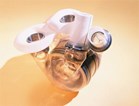Abiomed Receives FDA Approval Of The AbioCor®

Danvers, MA - Abiomed, Inc. announced recently that it has received Humanitarian Device Exemption (HDE) approval from the U.S. Food and Drug Administration (FDA) for its AbioCor® Implantable Replacement Heart (AbioCor). This landmark approval they say will provide patients suffering from heart failure on both sides of their heart (bi-ventricular) and who have no other alternative, a viable option for extending the quality of their life. The AbioCor is believed to be the first completely self-contained artificial heart that may allow patients more time at home, without wires or tubes piercing through their skin. This technology provides patients with complete mobility and remote diagnostics. 
According to the American Heart Association's 2006 Statistics, each year 57,000 patients in the United States die from chronic heart failure. While roughly 2,200 donor hearts are transplanted into patients suffering from heart failure, there are many more patients awaiting a second chance at life, for whom a heart transplant is not an option. Patients with advanced age, organ failure or cancer are, in most circumstances, ineligible for a heart transplant and are potential candidates to receive the AbioCor implantable heart. The HDE approval of the AbioCor signifies that no comparable alternative therapy exists for patients facing imminent death without the technology, and that it has proven to be safe and have probable benefit for patients, claim Abiomed.
The AbioCor is intended to replace the severely damaged native heart for patients who are not eligible for a transplant and have no other treatment alternative. The AbioCor sustains the body's circulatory system and is designed to extend the lives of patients who would otherwise die of heart failure, while also offering a probable benefit for a satisfactory quality of life. A post-market study is planned to allow Abiomed to monitor and optimize the introduction of the AbioCor into clinical use.
The FDA decision was completed after extensive review of the clinical testing, beginning with clinical trials starting in 2001 under an Investigational Device Exemption (IDE). The AbioCor would be available under an HDE to a limited patient population in the United States under this approval, with no more than 4,000 patients receiving the technology each year. In order to ensure the highest standards of patient care, Abiomed intends to make the AbioCor available through a controlled roll-out at approximately five to ten heart hospitals in the United States, including qualified clinical trial sites and additional qualified centers once they have completed a comprehensive and rigorous training program which may take six to eight months. Under HDE approval, the FDA may request a panel review of the post-approval study data. In addition, Abiomed is working with the Centers for Medicare and Medicaid Services (CMS) and private insurers to establish reimbursement policies for the AbioCor. Jewish Hospital in Louisville, KY, an AbioCor clinical trial site, will be among the first U.S. hospitals to offer patients the AbioCor. The Jewish Hospital/University of Louisville team, led by surgeons Laman Gray, M.D., and Rob Dowling, M.D., performed the first and second AbioCor implantable replacement heart procedures in the world and a total of seven implants since 2001. Two other hospitals are entering into a letter of intent. They are: The Johns Hopkins Hospital in Baltimore, MD, with Dr. John Conte, and Robert Wood Johnson University Hospital in New Brunswick, NJ, with Dr. Mark Anderson.
Abiomed continues to develop next-generation total artificial heart technology, the AbioCor II, in order to provide life-saving circulatory support to more patients in bi-ventricular heart failure. Currently in preclinical evaluation, this technology has the potential to last up to five years and is approximately 30 percent smaller than the AbioCor.
SOURCE: Abiomed, Inc.
